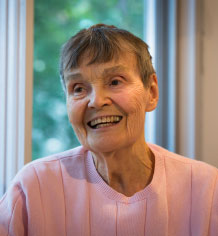| |
 |
| |
©2014 Julie Dermansky for Earthworks
|
Theo Colborn (1927-2014), was the founder of TEDX and is widely regarded as one of the founders of the field of endocrine disruption. A biography by Elisabeth Grossman describes her life and work. Following her death, an Announcement in Environmental Health Perspectives was published, co-authored by NIEHS Director Dr. Linda Birnbaum. In addition, TEDX created an Online memorial to collect stories about her life and how she impacted people around the world. In 2016, her contributions were described in this publication celebrating the 25th anniversary of endocrine disruption science.
Brief biography
Dr. Theo Colborn was the author of numerous scientific publications about compounds that interfere with hormones and other chemical messengers that control development in wildlife and humans. She edited Chemically Induced Alterations in Sexual and Functional Development: The Wildlife/Human Connection, published in 1992. The information from this volume and numerous subsequent scientific publications was popularized in her 1996 book, Our Stolen Future, co-authored with Dianne Dumanoski and J. Peterson Myers now published in 18 languages. Dr. Colborn's work prompted the enactment of new laws around the world and redirected the research of academicians, governments, and the private sector.
Dr. Colborn served on numerous advisory panels, including the U.S. Environmental Protection Agency Science Advisory Board, the Ecosystem Health Committee of the International Joint Commission of the United States and Canada, the Science Management Committee of the Toxic Substances Research Initiative of Canada, the U.S. EPA Endocrine Disruptor Screening and Testing Advisory Committee, and the EPA Endocrine Disruption Methods and Validation Subcommittee. She published and lectured extensively on the transgenerational effects of toxic chemicals on the developing endocrine, immune, metabolic, and nervous systems in the womb and early childhood.
Dr. Colborn published and lectured extensively on the transgenerational effects of toxic chemicals on the developing endocrine, immune, metabolic, and nervous systems in the womb and early childhood.
In 1985, Dr. Colborn received a Fellowship from the Office of Technology Assessment, U.S. Congress. She joined the Conservation Foundation in 1987 to provide scientific guidance for the 1990 book, Great Lakes, Great Legacy. From 1990-93 she held a position of Chair with the W. Alton Jones Foundation, and in 1993 was given a three-year Pew Fellows Award. She was the recipient of the 1997 Chatham College Rachel Carson Award, the 1999 Norwegian International Rachel Carson Prize, the 2000 International Blue Planet Prize, the 2003 Society of Toxicology and Environmental Chemistry Rachel Carson Award, the 2004 Center for Science in the Public Interest Rachel Carson Award, and the 2006 Beyond Pesticides Dragonfly Award.
She also received The Swedish Goteborg Prize for the Environment and Sustainability (2008); the TIME Global Environmental Heroes Award (2007); the National Council on Science and the Environment Lifetime Achievement Award (2007); and the University of California San Francisco Medical School/Collaborative for Health and the Environment Summit Award: A Woman on the Forefront: Leadership and Integrity in Science (2007), among others.
Dr. Colborn earned a Ph.D. at the University of Wisconsin-Madison in Zoology (distributed minors in epidemiology, toxicology, and water chemistry); an M.A. in Science at Western State College of Colorado (fresh-water ecology); and a B.S. in Pharmacy from Rutgers University, College of Pharmacy. Curriculum Vitae




